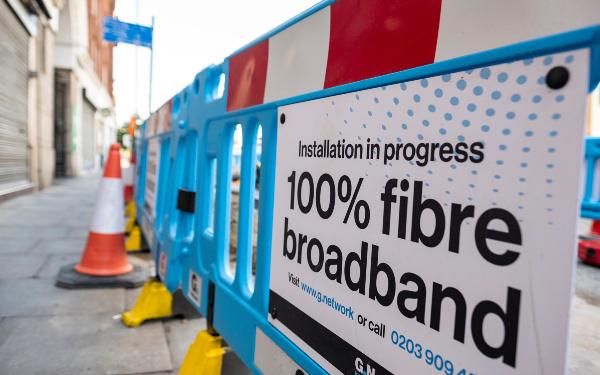
 Alex Wright is a reporter for Comms Business, a sister publication of Community Care, which is running the Fit to Switch campaign to raise awareness of the switch-off of the analogue phone network
Alex Wright is a reporter for Comms Business, a sister publication of Community Care, which is running the Fit to Switch campaign to raise awareness of the switch-off of the analogue phone network
First the good news: Britain is heading towards a world-class digitally interconnected future where all telecommunications and data transactions take place over reliable, high-speed fibre optics. Everything from streaming TV to sending emails to making voice calls is faster and easier over high-speed optical fibre cables.
Now the bad news: your existing call-handling, automated key-holder alerts, fire alarms and remote back-office support services will probably stop working as a result.
Switch-off deadline
That’s because the UK’s existing analogue legacy phone network will be switched off by 31 January 2027, and replaced with a fully digital network that uses internet protocol (IP) technology across a fibre-based service.
That means every phone line in the country will become digital, routing calls over IP rather than the traditional public switched telephone network (PSTN) or the integrated services digital network (ISDN).
Any services that aren’t switched to the new network will be lost. It’s not just phone services that will be affected either. There are large amounts of equipment that remain connected to soon-to-be-retired telecoms infrastructure.
This includes lift emergency lines, building entry systems, fire and door alarms, burglar alarms, CCTV, vending machines, a range of medical equipment and telecare alarms and devices.
That’s why Comms Business has launched the Fit To Switch campaign to raise awareness about the PSTN switch-off and any associated issues.
Critical affected services
Any interruption or disruption to essential care services, and the key communications system and infrastructure needed to support them, can be potentially life-threatening.
However, many social care managers may be unaware of the need to switch over affected devices, particularly if the costs associated with renting the line and maintaining the equipment are covered by ongoing contracts.
For many organisations, devices such as automated burglar alarms, emergency call-lines in lifts, remotely monitored process fail-safes or even credit card payment systems are services they buy on recurring monthly terms from specialist third-party providers.
These specialists install dedicated telephone lines to ensure their call handlers or data centres are automatically contacted the moment the customer needs their services.
This wasn’t a problem when we had a copper telephone network for those services to quietly run on. But now all these lines are going to have to transition from copper to fibre. And that is not just a matter of unplugging one piece of kit and plugging in another.
The old copper network provides ‘always on’, fail-safe functionality. The system runs on its own 48Volt DC power supply, regularly pulsing a ‘chirrup’ up the line to check continuity of signal. It is this pulse which provides the familiar dial-tone, reassuring the user that there is a working line to the exchange equipment. But once the copper line is retired, the 48Volt equipment will no longer work.
Celebrate those who’ve inspired you
We’re expanding our My Brilliant Colleague series to include anyone who has inspired you in your career – whether current or former colleagues, managers, students, lecturers, mentors or prominent past or present sector figures whom you have admired from afar.
Nominate your colleague or social work inspiration by filling in our nominations form with a letter or a few paragraphs (100-250 words) explaining how and why the person has inspired you.
If you have any questions, email our community journalist, Anastasia Koutsounia, at anastasia.koutsounia@markallengroup.com
Implications of switch-off
By contrast, the fibre line is entirely passive until it is ‘lit’ by equipment at the business end. Lighting the line requires a modem and a power source.
So, we are moving from a system that powers itself remotely to a system that has to be powered from the user’s end. This raises two major questions:
- Firstly, is your alarm or process provider equipped to update your kit ahead of the copper switch-off?
- Secondly, what happens if there is a mains power failure?
Beyond that, the logistical implications for the organisation are obvious. Is there even power available to the equipment? Will it need to be re-sited? Does it need to be wired into the emergency circuits? Will it need battery back-up or a dedicated 5G modem?
When Comms Business raised the issue with the trade associations who represent two of the most obvious ‘at risk’ service sectors – lift suppliers and fire alarm companies – their responses yielded only referrals to articles and supplier sales presentations made at past industry conferences.
There was no specific guidance for their members. There was no directory of members whose systems are tested and ready for the non-copper future.
The need to start planning today
With the old copper infrastructure due to be phased out completely across the UK by 31 January 2027, it’s vital for organisations to start planning for the switchover today.
Everything connected to your phone lines needs to be audited and reviewed to identify affected services so that you can order timely technology upgrades.
Rather than being a negative, however, the switch-off represents a prime opportunity for the social care sector to undergo a digital transformation that should drive improved outcomes and experiences, as well as seamless communication and collaboration among care staff.
For more information about Fit to Switch and the PSTN switch-off, visit the campaign website.
To find out if your organisation is affected, complete the Fit to Switch survey.



 Bournemouth, Christchurch and Poole
Bournemouth, Christchurch and Poole  Hampshire County Council
Hampshire County Council  Oxfordshire County Council
Oxfordshire County Council  South Gloucestershire Council
South Gloucestershire Council  Wokingham Borough Council
Wokingham Borough Council  Webinar: building a practice framework with the influence of practitioner voice
Webinar: building a practice framework with the influence of practitioner voice  ‘They don’t have to retell their story’: building long-lasting relationships with children and young people
‘They don’t have to retell their story’: building long-lasting relationships with children and young people  Podcast: returning to social work after becoming a first-time parent
Podcast: returning to social work after becoming a first-time parent  How managers are inspiring social workers to progress in their careers
How managers are inspiring social workers to progress in their careers  Workforce Insights – showcasing a selection of the sector’s top recruiters
Workforce Insights – showcasing a selection of the sector’s top recruiters 

 Facebook
Facebook X
X LinkedIn
LinkedIn Instagram
Instagram
Social care has a long and admirable track record in managing technological advances. Social work specifically has provided practitioners with state of the art computer hardware and the latest software so I’m sure we are well prepared for the switchover. All will be well and a seamless transition is likely to be as smooth and trouble free as in previous occasions.